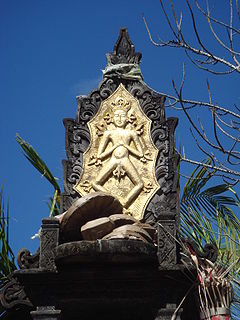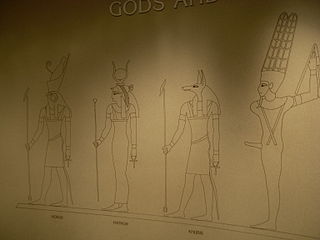Agnosticism is the view that the existence of God, of the divine or the supernatural is unknown or unknowable. Another definition provided is the view that "human reason is incapable of providing sufficient rational grounds to justify either the belief that God exists or the belief that God does not exist."

Henotheism is the worship of a single, overarching god while not denying the existence or possible existence of other lower deities. Friedrich Schelling (1775–1854) coined the word, and Friedrich Welcker (1784–1868) used it to depict primitive monotheism among ancient Greeks.

Religion in pre-Islamic Arabia included indigenous animistic-polytheistic beliefs, as well as Christianity, Judaism, Mandaeism, and Iranian religions of Zoroastrianism, Mithraism, and Manichaeism. Arabian polytheism, the dominant form of religion in pre-Islamic Arabia, was based on veneration of deities and spirits. Worship was directed to various gods and goddesses, including Hubal and the goddesses al-Lāt, al-‘Uzzā, and Manāt, at local shrines and temples such as the Kaaba in Mecca. Deities were venerated and invoked through a variety of rituals, including pilgrimages and divination, as well as ritual sacrifice. Different theories have been proposed regarding the role of Allah in Meccan religion. Many of the physical descriptions of the pre-Islamic gods are traced to idols, especially near the Kaaba, which is said to have contained up to 360 of them.
Monotheism is the belief in one god. A narrower definition of monotheism is the belief in the existence of only one god that created the world, is omnipotent, omnipresent and omniscient, and intervenes in the world.

Theism is broadly defined as the belief in the existence of a Supreme Being or deities. In common parlance, or when contrasted with deism, the term often describes the classical conception of God that is found in monotheism – or gods found in polytheistic religions—a belief in God or in gods without the rejection of revelation as is characteristic of deism.
A creator deity or creator god is a deity or god responsible for the creation of the Earth, world, and universe in human religion and mythology. In monotheism, the single God is often also the creator. A number of monolatristic traditions separate a secondary creator from a primary transcendent being, identified as a primary creator.
Monolatry is belief in the existence of many gods but with the consistent worship of only one deity. The term "monolatry" was perhaps first used by Julius Wellhausen.

Omnipresence or ubiquity is the property of being present anywhere and everywhere. The term omnipresence is most often used in a religious context as an attribute of a deity or supreme being, while the term ubiquity is generally used to describe something "existing or being everywhere at the same time, constantly encountered, widespread, common". Ubiquitous can also be used as a synonym for words like worldwide, universal, global, pervasive, all over the place. Being Omnipresent relates to the fact of having the presence of God everywhere.

The argument from inconsistent revelations is an argument which aims to show that we cannot rationally choose one religion over another. The argument states that since a person not privy to revelation must either accept it or reject it based solely upon the authority of its proponent, and there is no way for a mere mortal to resolve these conflicting claims by investigation, it is prudent to reserve one's judgment.

Negative atheism, also called weak atheism and soft atheism, is any type of atheism where a person does not believe in the existence of any deities but does not necessarily explicitly assert that there are none. Positive atheism, also called strong atheism and hard atheism, is the form of atheism that additionally asserts that no deities exist.
The existence of God is a subject of debate in the philosophy of religion and popular culture.
Apatheism is the attitude of apathy towards the existence or non-existence of God(s). It is more of an attitude rather than a belief, claim, or belief system. The term was coined by Robert Nash in 2001.
Agnostic theism, agnostotheism or agnostitheism is the philosophical view that encompasses both theism and agnosticism. An agnostic theist believes in the existence of a God or gods, but regards the basis of this proposition as unknown or inherently unknowable. The agnostic theist may also or alternatively be agnostic regarding the properties of the God or gods that they believe in.

God, in monotheistic thought, is conceived of as the supreme being, creator deity, and principal object of faith. God is usually conceived as being omnipotent (all-powerful), omniscient (all-knowing), omnipresent (all-present) and omnibenevolent (all-good) as well as having an eternal and necessary existence. These attributes are used either in way of analogy or are taken literally. God is most often held to be incorporeal (immaterial). Incorporeality and corporeality of God are related to conceptions of transcendence and immanence of God, with positions of synthesis such as the "immanent transcendence".
Conceptions of God in monotheist, pantheist, and panentheist religions – or of the supreme deity in henotheistic religions – can extend to various levels of abstraction:
This is a glossary of spirituality-related terms. Spirituality is closely linked to religion.

Polytheism is the worship of or belief in multiple deities, which are usually assembled into a pantheon of gods and goddesses, along with their own religions and rituals. In most religions which accept polytheism, the different gods and goddesses are representations of forces of nature or ancestral principles, and can be viewed either as autonomous or as aspects or emanations of a creator deity or transcendental absolute principle, which manifests immanently in nature.

A false god is, in some monotheistic religious denominations, the deities of pagan religions – as well as other competing entities or objects to which particular importance is attributed. Conversely, polytheistic pagans may regard the gods of various monotheistic religions as "false gods" because they do not believe that any real deity possesses the properties ascribed by monotheists to their sole deity. Atheists, who do not believe in any deities, do not usually use the term "false god" even though that would encompass all deities from the atheist viewpoint. Usage of this term is generally limited to theists, who believe in some deity or deities, but not in others.
Mesoamerican religion is a group of indigenous religions of Mesoamerica that were prevalent in the pre-Columbian era. Two of the most widely known examples of Mesoamerican religion are the Aztec religion and the Mayan religion.

A deity or god is a supernatural being considered divine or sacred. The Oxford Dictionary of English defines deity as "a god or goddess ", or anything revered as divine. C. Scott Littleton defines a deity as "a being with powers greater than those of ordinary humans, but who interacts with humans, positively or negatively, in ways that carry humans to new levels of consciousness, beyond the grounded preoccupations of ordinary life". A goddess is a female deity.